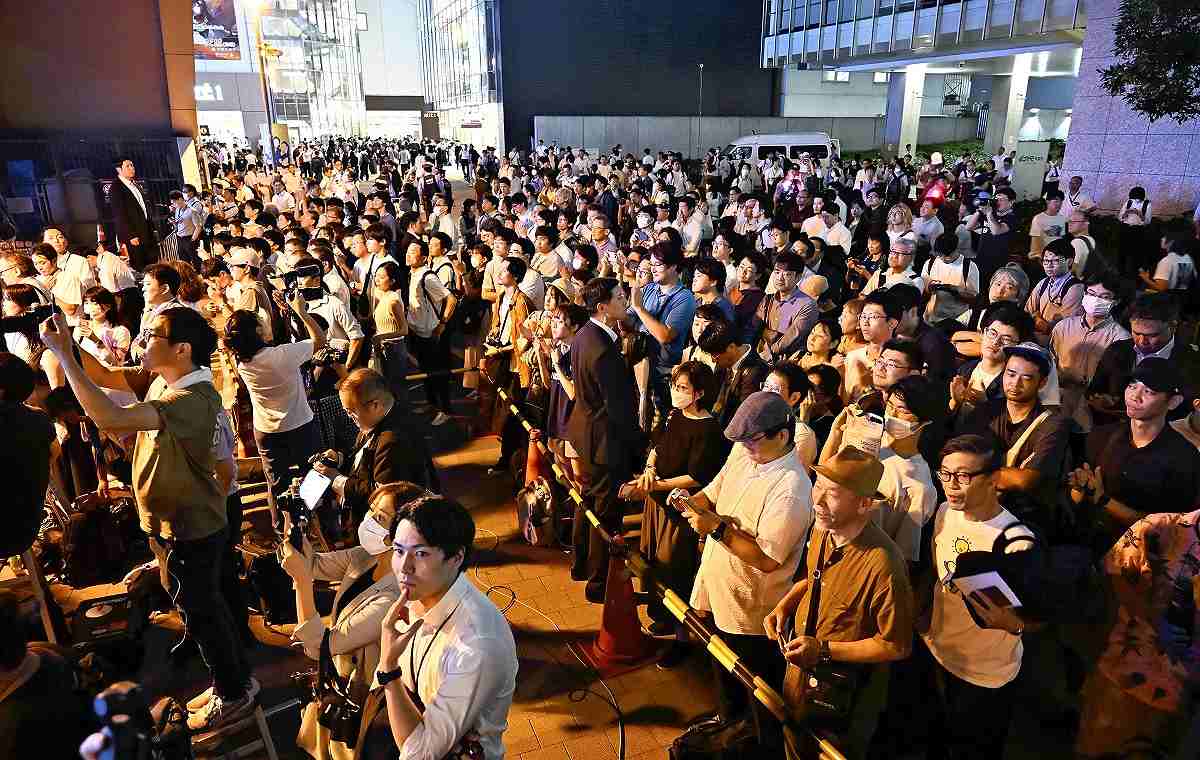LDP Leadership Race Focuses on Financial Income Taxation; Previous Plans were Shelved after Market Backlash in 2021

People gather for a Liberal Democratic Party presidential election debate event in Chiyoda Ward, Tokyo, on Thursday.
6:00 JST, September 21, 2024
Increasing the rates of taxation on financial income has become one of the points of contention being debated Liberal Democratic Party’s presidential race.
Such increases would be expected to bring in more tax revenue from the wealthiest in society, who currently have a relatively low tax burden, and some in the business community have also voiced support.
However, as shown by Prime Minister Fumio Kishida’s past shelving of a similar plan due to backlash from the financial markets, there is also a lot of negative commentary from the business community.
Former LDP Secretary General Shigeru Ishiba called for an increase in the tax rate in the run-up to the LDP presidential election. “The question is how a fair tax system can be achieved,” he said.
However, few of the LDP’s presidential candidates seem to agree with him.
LDP Secretary General Toshimitsu Motegi and former Environment Minister Shinjiro Koizumi hold a negative stance on the issue, with Motegi saying, “Tax increases are not the right policy direction.” Koizumi said, “This is not the time to dampen the movement of savings into investments.”
Digital minister Taro Kono and former economic security minister Takayuki Kobayashi also expressed their stance in opposition to the idea.
Chief Cabinet Secretary Yoshimasa Hayashi said, “We should carefully assess the situation and only then consider whether to do anything further.”
Following Kishida’s victory in the LDP leadership election in 2021, the Nikkei 225 stock average fell for six consecutive business days. Kishida had been calling for increasing the rates of taxation on financial income.
The prolonged decline in stock prices, known as the “Kishida shock,” led to his plan being shelved.
Ishiba, who supports higher taxes on the wealthy, said he has “no intention” of discouraging people from investing, such as through the new NISA tax exemption program for small investments, by raising taxes on such investments.
Japan has a progressive income tax system on wages, where the tax rate increases as taxable income increases.
In the progressive tax system, the tax rate is 5% on taxable income of less than ¥1.95 million, 10% on taxable income from ¥1.95 million to less than ¥3.3 million, and eventually reaches 45% on income of ¥40 million or more. Meanwhile, the total tax rate on financial income from stocks and mutual funds is a flat 20%.
Under this system, the wealthiest tend to have a lower tax burden. This is because the higher the income, the proportion of income that comes from stocks and mutual funds also increases.
Strengthening the taxation of financial income has become a point of contention in the LDP leadership race, with some arguing that the current system is unfair.
According to the National Tax Agency’s 2022 Sample Survey for Self-Assessment Income Tax, the tax burden rate is 3.9% for those with a total income over ¥3 million and up to ¥5 million.
For those with a total income over ¥50 million and up to ¥100 million, the tax burden rate increases with income and peaks at 26.3%. It then gradually decreases once income exceeds ¥100 million. The average tax burden rate for those with incomes of more than ¥100 million is 22.5%.
Takeshi Niinami, representative director of the Japan Association of Corporate Executives (Keizai Doyukai) said at a press conference this month that a tax rate on financial income as high as 25% is fine, as long as the flow of asset management is not hindered.
He said that LDP presidential candidates should have a serious discussion on the issue.
Meanwhile, Nomura Securities Co. Economist Hajime Yoshimoto said, “It is an issue that the business community and financial markets tend to be wary of, as it could affect the investment returns of the middle class.”
Related Tags
Top Articles in Politics
-

Japan PM Takaichi’s Cabinet Resigns en Masse
-

Sanae Takaichi Elected 105th Prime Minister of Japan; Keeps All Cabinet Appointees from Previous Term
-

Japan’s Govt to Submit Road Map for Growth Strategy in March, PM Takaichi to Announce in Upcoming Policy Speech
-

LDP Wins Historic Landslide Victory
-

LDP Wins Landslide Victory, Secures Single-party Majority; Ruling Coalition with JIP Poised to Secure Over 300 seats (UPDATE 1)
JN ACCESS RANKING
-

Japan PM Takaichi’s Cabinet Resigns en Masse
-

Japan Institute to Use Domestic Commercial Optical Lattice Clock to Set Japan Standard Time
-

Israeli Ambassador to Japan Speaks about Japan’s Role in the Reconstruction of Gaza
-

Man Infected with Measles Reportedly Dined at Restaurant in Tokyo Station
-

Man Infected with Measles May Have Come in Contact with Many People in Tokyo, Went to Store, Restaurant Around When Symptoms Emerged




















